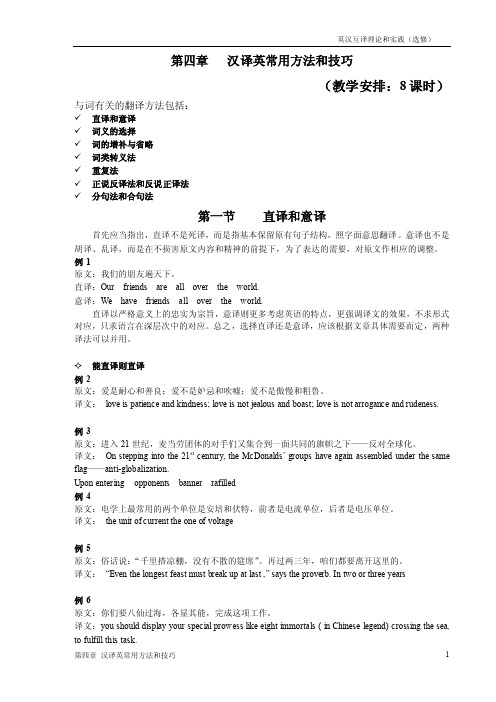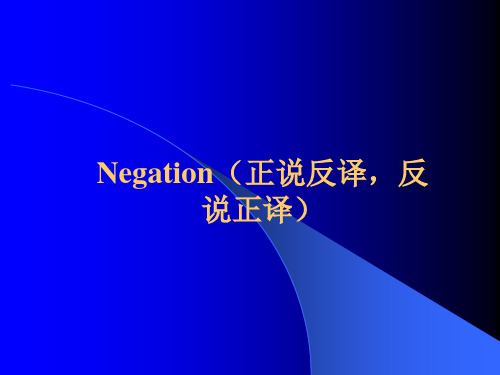第四讲正说反译、反说正译法
第四章汉译英常用方法和技巧(8-11)

第四章汉译英常用方法和技巧(教学安排:8课时)与词有关的翻译方法包括:✓直译和意译✓词义的选择✓词的增补与省略✓词类转义法✓重复法✓正说反译法和反说正译法✓分句法和合句法第一节直译和意译首先应当指出,直译不是死译,而是指基本保留原有句子结构,照字面意思翻译。
意译也不是胡译、乱译,而是在不损害原文内容和精神的前提下,为了表达的需要,对原文作相应的调整。
例1原文:我们的朋友遍天下。
直译:Our friends are all over the world.意译:We have friends all over the world.直译以严格意义上的忠实为宗旨,意译则更多考虑英语的特点,更强调译文的效果,不求形式对应,只求语言在深层次中的对应。
总之,选择直译还是意译,应该根据文章具体需要而定,两种译法可以并用。
✧能直译则直译例2原文:爱是耐心和善良;爱不是妒忌和吹嘘;爱不是傲慢和粗鲁。
译文:love is patience and kindness; love is not jealous and boast; love is not arrogance and rudeness.例3原文:进入21世纪,麦当劳团体的对手们又集合到一面共同的旗帜之下——反对全球化。
译文:On stepping into the 21st century, the McDonalds’ groups have again assembled under the same flag——anti-globalization.Upon entering opponents banner rafilled例4原文:电学上最常用的两个单位是安培和伏特,前者是电流单位,后者是电压单位。
译文:the unit of current the one of voltage例5原文:俗话说:“千里搭凉棚,没有不散的筵席”。
再过两三年,咱们都要离开这里的。
正说反译-反说正译

“It + be + adj. + noun + that…”句式的反面着笔 译法: (17) It is a wise father that knows his own child. 聪明的父亲也未必了解他自己的孩子。 (18) It is an ill wind that blows nobody good. 坏事未必对人人都有害处。 (19) It is a good workman that never blunders. 智者千虑必有一失。 (20) It is a long lane that has no turning. 凡事总有变化,还会永远不变。
(1) I couldn’t agree more. (2) You couldn’t be better off, could you? (3) Nothing is farther from the truth. (4) I can hardly imagine two men less capable of getting on together. (5) I was weighed down with grief; my friend’s books offered little release, less escape. (6) He could not care less about money.
(6) They didn’t praise him in the slightest. (7) I’m afraid not. (8) I don’t know how often I haven’t warned you. (9) His speech leaves much to be desired. (10) No news is good news.
翻译技巧-正反翻译

4 10
If reading is to accomplish anything more than passing time, it must be active.
如果阅读不仅仅是为了消磨时间,那么阅读必须是积极主动地。
4 10
Transactions of business mail with huge data attachments can be performed without any stress in mobile environments, which may make the word “desk-work” go out of date.
Of course, English-speaking people have their own way of
thinking in the negation and expressing negative implications. What is affirmative in form in English may be implied something negative in Chinese, and vice versa.
4 10
英语反面表达转换为汉语正面表达
• (1) You can't be too careful. 你要特别小心 。 • (2) The significance of these incidents wasn't lost on us. 这些事件引起了我们的重 视。 • (3) Such flights couldn't long escape notice. 这类飞行迟早会被人发觉的。
4 10
6. Keep in lane! 不准换线! 7. Keep off the lawn! 请勿践踏草地!(正说 反译) 8. I couldn’t agree more with you. 我完全同 意你的看法。 9. Just make yourself at home. 不要客气。/ 别见外 。 10. His speech leaves much to be desired. 他的讲话很不如人意。
正说反译

But you see, we both cannot go.
但是我要告诉你,我们俩不能同时都 但是我要告诉你,我们俩不能同时都走。 不能同时
(5)for all one care / know ) You may leave at once for all I care. 你尽可立即离开,我才不管呢。 你尽可立即离开,我才不管呢。 (6)It be + adj. + noun. + that… ) It is a long lane that has no end. 路必有弯。(凡事总会有变化,不会永远不变) 路必有弯。(凡事总会有变化,不会永远不变) 。(凡事总会有变化 It is an ill wind that blows nobody good. 坏事未必对人人都有害处。 坏事未必对人人都有害处。
定义: 定义: Negation作为一种翻译技巧,它主要是指在翻译实践中,为了 作为一种翻译技巧, 作为一种翻译技巧 它主要是指在翻译实践中, 使译文忠实而合乎语言习惯地传达原文的意思, 使译文忠实而合乎语言习惯地传达原文的意思,有时必须把原文 中的肯定说法变成译文中的否定的说法, 中的肯定说法变成译文中的否定的说法,或把原文中的否定说法 变成译文中的肯定说法。因此,在译文技巧中的negation译成 变成译文中的肯定说法。因此,在译文技巧中的 译成 正说反译,反说正译” “正说反译,反说正译”。
• 4)这家机构因公正在国际上享有声誉。 这家机构因公正在国际上享有声誉。 公正在国际上享有声誉 • The agency enjoys an international impartiality.(名词) .(名词 reputation for impartiality.(名词) • 5)她光着脚走进了房间。 光着脚走进了房间 走进了房间。 • She came into the room with no shoes on.(介词短语) .(介词短语 on.(介词短语) • 6)尼克松是个彻底的现实主义者。 尼克松是个彻底的现实主义者。 彻底的现实主义者 • Nixon was nothing if not a realist.(短语) .(短语 realist.(短语)
正译与反译

表示否定的副词或副词短语: 表示否定的副词或副词短语: little, otherwise, too…to.. etc. 1. 显然他有不同的想法。 显然他有不同的想法。 He evidently thinks otherwise. 2. 他兴奋得说不出话来了。 他兴奋得说不出话来了。 He was too excited to speak.
反说法: 反译法 / 反说法: 用英语形式上否定的英语词表达汉语肯定的意义。 用英语形式上否定的英语词表达汉语肯定的意义。 1. 他这学期全勤。 他这学期全勤。 He has never missed a class this semester. 2. 开卷有益。 开卷有益。 One cannot read a book without leaning something. Reading is always beneficial 3. 我对你感激万分。 我对你感激万分。 I couldn’t thank you enough.
2011-12-31 4
表示否定的形容词或形容词短语: 表示否定的形容词或形容词短语:few, little, free from, far from, safe from, short of etc. 1. 他的作文中几乎没有语法错误。 他的作文中几乎没有语法错误。 There are few grammatical mistakes in his composition. 2. 那家伙极不诚实。 那家伙极不诚实。 That fellow is far from being honest. 3. 欲速则不达。 欲速则不达。 More haste, less speed. Haste makes waste. Haste brings no success. 2011-12-31 5
与翻译有关的那些--反译法剖析

正说反译法(短语)
某些固定短语一般要译作否定:
far from; free from; prevent… from; protect from….
but for; but that; anything but; cannot but.
other than; rather than; more than…can; 比较级+ than to do
我们要永远对生活抱乐观态度。
5. His pronunciation is no better than mine.
他的发音和我的一样糟糕。
英语、汉语中都有从正面或反面 来表达一种概念的现象。
这里所谓正面表达和反面表达,
主要是指在英语中是否用
“no,not,never”或“de-, dis-, non-, im-, in-,un-,-less”等否定性词缀的 词;在汉语中是否用“不、非、无、
His hesitation led to his failure. • 他不果断/犹豫不决导致了他的失败。
正说反译法(虚词:介词)
To do this is beyond my ability. 干这事我力不胜任。 It was beyond his power to do so. 他无权这样做。 What you’ve said is above me. 你所说的我不懂。
反译法/正说反译、 反说正译法
(Negation)
试译以下句子: 1. No Smoking! 2. Wet Paint! 3. Just make yourself at home. 4. We must never stop taking an
optimistic view of life. 5. His pronunciation is no better
四六级英汉互译中的正反反正表达法详解

在英汉互译过程中,由于两种语言表达习惯不同,往往需要把英语中的正说译成汉语中的反说,把英语中的反说译成汉语中的正说,或反之,这样才能确切表达原意并符合语言的规范。
这种把正说处理为反说,把反说处理为正说的译法,叫正反、反正表达法。
这种正说和反说的相互转换是翻译技巧中的一个重要方法。
它属于引申和修辞范围。
那么,什么是正说和反说呢?英语词句中含有“never”,“no”,“not”,“non-”,“un-”,“im-”,“in-”,“ir-”,“-less”等成分以及汉语词句中含有“不”、“没”、“无”、“未”、“甭”、“别”、“休”、“莫”、“非”、“毋”、“勿”等成分的为反说,不含有这些成分的为正说。
正说和反说包括的词类范围很广,不仅包括动词、形容词、副词、名词、介词和连词,而且包括各种词组,短语和从句。
现以实例对正反、反正表达法加以说明。
一、英译汉正说反译法在不少情况下,由于有的词语含有特殊意义,如不从反面着笔,译文就不通,这时必须反说。
例如:)“I have read your articles.I expect to meet an old man.”我读过你的文章,没想到你这样年轻。
”(动词))He was absent from his own country last year.他去年不在自己的国家。
(形容词短语))He dived into the water fully clothed and rescued the children.他衣服没脱就跳入水中,把孩子救了上来。
(副词))He was extremely sorry for the shortness of time.他对时间不足感到十分抱歉。
(名词))I do think that it is beyond his power to fulfill the task.我的确认为要完成这项任务是他力所不及的。
(介词))The lecture was interesting,but as far as I am concerned the speaker was speaking over my head.这讲座很有趣,但对我来说,讲座太深了,听不懂。
正反、反正翻译法 ppt课件

The thought of returning to his native land never
deserted him.
归国的念头始终萦绕在他ppt课的件 心中。
16
(3)形容词
英文反面,译文正面
He was an indecisive sort of person and always
would probably have been a success. • 如果他不发脾气,谈判很可能已经成功了。 • The mistake escaped me. • 我没注意到这个错误。
ppt课件
6
正反、反正表示法
• (二)副词
• We may safely say so. • 我们这样说错不了。
• 在中文中,正面和反面表达主要是指是否
用“非”,“无”,“没(有)”,
“未”,“否”等字。
ppt课件
5
正反、反正表示法
• 一、英语从正面表达,译文从反面表达 • (一)动词 • Such a chance was denied me. • 我没有得到这样一个机会。 • If he had kept his temper, the negotiation
carefully and cautiously as he does the unfamiliar.
科学家们在处理熟知的事物时,必须像处理陌生
的事物一样小心谨慎。ppt课件
17
(四)名词
1.It was said that someone had sown discord among them. 据说有人在他们中间挑拨离间。
样的话。
Good winner, good loser. 胜不骄,败不馁。
- 1、下载文档前请自行甄别文档内容的完整性,平台不提供额外的编辑、内容补充、找答案等附加服务。
- 2、"仅部分预览"的文档,不可在线预览部分如存在完整性等问题,可反馈申请退款(可完整预览的文档不适用该条件!)。
- 3、如文档侵犯您的权益,请联系客服反馈,我们会尽快为您处理(人工客服工作时间:9:00-18:30)。
Negation (正说反译、反说正译法)
The English language has its peculiarities in negation. Of course, English-speaking people have their own way of thinking in the negation and expressing negative implications. What is affirmative in form in English may be implied something negative in Chinese, and vice versa. The use of “yes” and “no” is a case in point.
1.--“Are you not going tomorrow?”
--“No, I’m not going.”
2. “I don’t think you’re right in this point.”
Discussion: “你是人,你不是东西。
你是东西吗?你真不是东西!?我认为你不是东西。
你算什么东西!”
Version: You’re a person, not a thing. Aren’t you a person/a thing? Are you reliable/ some-thing? No, I don’t think so./Yes, I think so. What a creature you are! What a fool you are! You are a sheer idiot. I think you are an idiot. I don’t think you are tr ustworthy. You, really, are nothing. You think you are something. No, far from it.
Purposes of Affirmation and Negation
1. to make the meaning clear,
2. to strengthen the rhetorical effect,
3. make it conform to the idiomatic use of the target language
A. Some Idiomatic Expressions
1. riot police 防暴警察(即anti-riot police,而不是暴乱的警察)
2. crisis law 反危机法案(即anti-crisis law)
3. spy film 反谍影片
4. After you, sir. 先生,您先请。
5. 路上辛苦了。
原译:You must have had a tiring journey.
改译:Did you have a good trip?
6. Keep in lane! 不准换线!
7. Keep off the lawn! 请勿践踏草地!(正说反译)
8. I couldn’t agree more with you. 我完全同意你的看法。
9. Just make yourself at home. 不要客气。
/别见外
10. He was the last man to say such things. 他绝不会说这样的话。
B. Negation--Affirmation
1. Isn’t it funny! 真逗!
2. When Stephen was introduced to the old couple, they said simply, “We’ve read your article. We expected to meet an older man.”
当史蒂夫被介绍给这对老年夫妇的时候,他们只是淡淡地说:“我们看过你的文章,但没想到你这么年轻。
”
3. The thought of returning to his native land never deserted him.
归国的念头始终萦绕在他的心中。
C. Affirmation--Negation
4 .That’s a thing that might happen to any man.
原译:这样的事情可能发生在任何人身上。
改译:这种事情谁也难免。
5. His speech leaves much to be desired.
他的讲话很不如人意。
6. Appearances are deceptive.
外貌是靠不住的。
D: The Shift of Perspective (视角转换)
7 .Good winner, good loser.
胜不骄,败不馁。
8. 在美国,人人都能买到枪。
原译:In the United States, everyone can buy a gun.
改译:In the United States, guns are available to everyone.
9. The darkness was thinning, but they were still in bed.
天渐渐有些亮了,但他们还在睡。
练习
1.I have failed to convince him of his error.
2.The teacher found some of the students absent.
3.His answer is beside the mark.
4.They never see each other without talking about Super Girl's V oice.
5.The County Party Committee there is ignorant of conditions at the lower lever.
6.That fellow is far from being honest.
7.She refrained from laughing.
8.All graduates from the Foreign Languages Institutes will not be appointed to do
translation work.。
